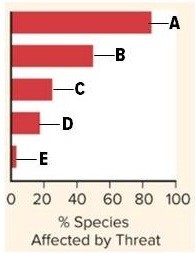Explain how IS elements produce target-site duplications when they move
What will be an ideal response?
The enzyme transposase makes a staggered cut in the target sequence of the recipient DNA. The IS element is inserted, becoming joined to the single-stranded ends. The gaps are then filled in by DNA replication, resulting in a copy of both the IS element and the target sequence.
You might also like to view...
In adaptive immune responses, which cell type is capable of acting as an antigen-presenting cell?
a. T cell b. monocyte c. eosinophil d. B cell e. basophil
The number of chromatids present in a duplicated chromosome is
a. 1. b. undetermined. c. half that of an unduplicated chromosome. d. 2. e. 4.
Researchers have identified several factors that have increased the number of threatened and endangered species. Identify the causes, as defined by the percentage (%) of species affected.Use the following word bank: pollution, overexploitation, disease, exotic species, habitat loss. A:________B:________C:________D:________E:________
A:________B:________C:________D:________E:________
What will be an ideal response?
The effects of elevated atmospheric CO2 concentrations
A. have the potential to alter the nutritional status of plants. B. allow the plant to use O2 more efficiently in photosynthesis. C. have the potential to allow herbivores to eat less plant matter. D. cause an increase in rubisco production. E. have no effect on nutrient levels found in plant leaves.